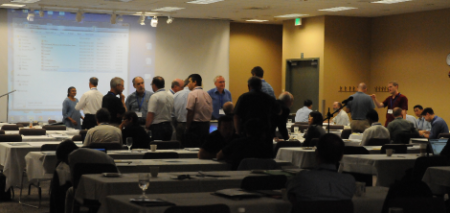More 1IWRP highlights
/As I reported on Wednesday, I've been at 1IWRP, a workshop on rock physics in the petroleum industry. Topics ranged from lab core studies to 3D digital scanners, and from seismic attenuation and dispersion to shales and anisotropy. Rock physics truly crosses a lot of subject areas.
Here are a few of the many great talks that really stood out for me:
Mark Chapman from the University of Edinburgh, submitted a new formulation for frequency dependant AVO analysis. He suggested that if a proper rock physics model of the rock is described, frequency can be decomposed from seismic gathers for improved reservoir characterization. Some folks in the crowd warned that the utility of this work might be limited to select cases with a full band impedance change, but his method appears to be a step beyond the traditional AVO workflow.
Arthur Cheng from Halliburton talked about modeling techniques to estimate anisotropic parameters from borehole measurements. He descibed the state of the art in acoustic logging tools, and used a ray-tracing VSP forward model to show a significant smear of reflection points through an anisotropic earth layer. He touched on the importance of close interaction between service companies and end users, especially those working in complex environments. In particular: service companies have a good understanding of data precision and accuracy, but it's usually not adequately transfered to the interpreter.
Colin Sayers from Schlumberger presented several talks, but I really enjoyed what he had to say about sonic and seismic anisotropy and how it is relevant to characterizing shale gas reservoirs. Fracture propagation depends on the 3D stress state in the rock: hard to capture with a 1D earth model. He showed an example of how hydraulic fracture behaviour could be more accurately predicted by incorporating anisotropic stress dependant elastic properties. I hope this insight permeates throughout the engineering community.
Rob Lander from Geocosm showed some fresh-out-of-the-oven simulations of coupled diagenesis and rock physics models for predicting reservoir properties away from wells. His company's workflow has a basis in petrography, integrating cathodluminescence microscopy and diagenetic modeling. Really inspiring and integrated stuff. I submit to you that this presentation would be equally enjoyed at a meeting of AAPG, SPE, SPWLA, SEG, or SCA — that's not something that you can say about every talk.

← Every break heralded a new discussion. The delegates were very actively engaged.
Today, I am going on a field trip to the Niobrara Shale Quarry. After four days indoors, I'm looking forward to getting outside and hammering some rocks!








 Except where noted, this content is licensed
Except where noted, this content is licensed